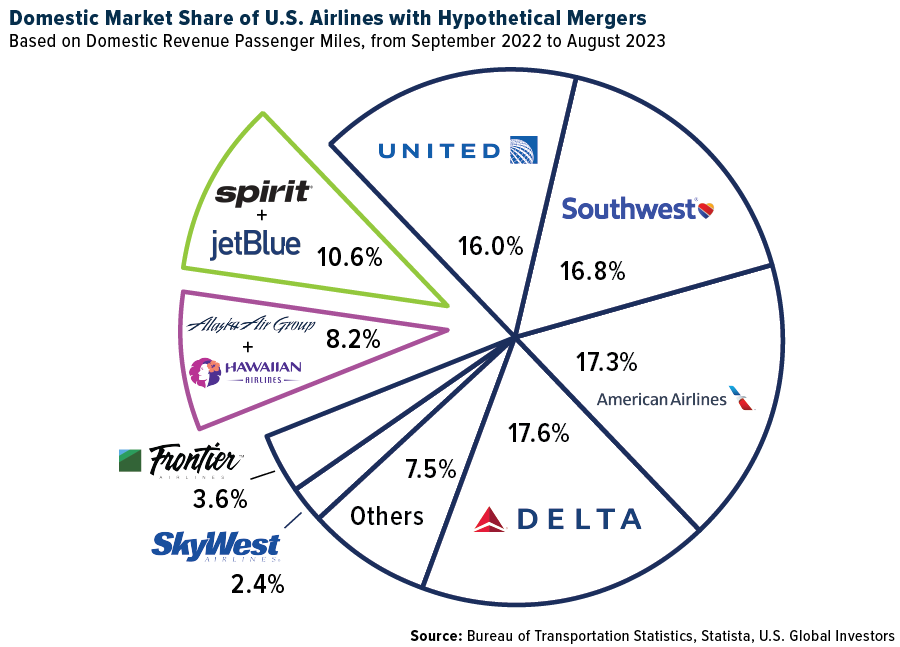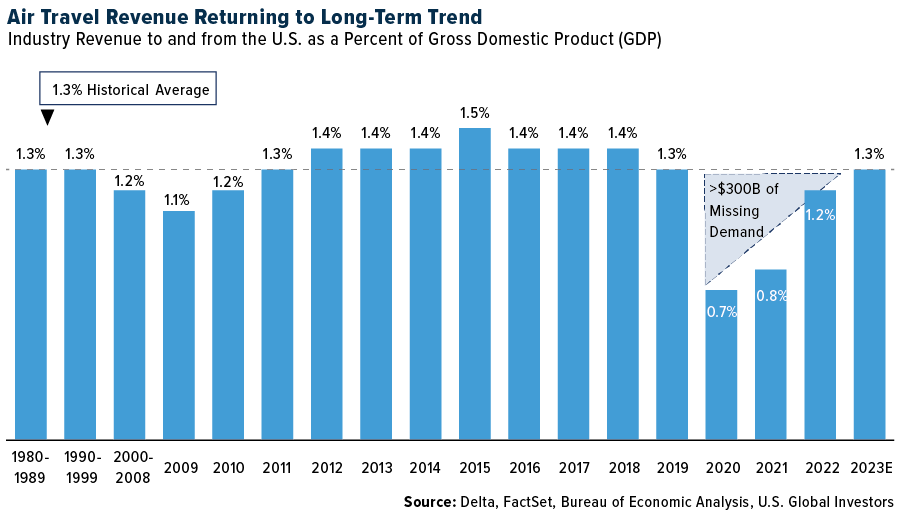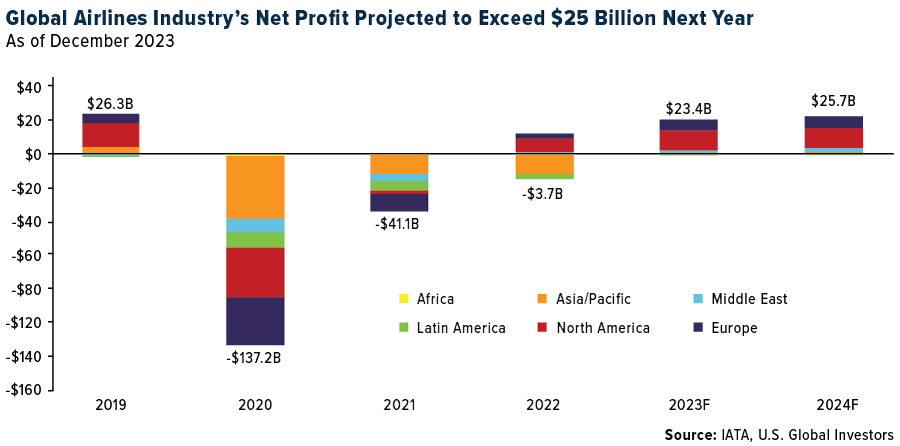Airline consolidation is not only relatively common but necessary for growth and competitiveness, and the recent announcement of Alaska Airlines' (NYSE:ALK) planned acquisition of Hawaiian Airlines (NASDAQ:HA) is a prime example of this trend.
The move, valued at $1.9 billion, signifies more than just a business transaction. It represents a strategic positioning for future growth in a highly competitive, highly concentrated sector.
Once the deal is completed, Alaska and Hawaiian will have a combined market share of approximately 8.2%, making it the fifth-largest U.S. airline—unless JetBlue Airways (NASDAQ:JBLU) succeeds in getting regulatory approval to acquire rival low-cost carrier Spirit Airlines (NYSE:SAVE). More on that later.

Alaska’ offer to purchase Hawaiian for $18 per share—today it’s trading around $13—includes taking on $900 million in debt, but the potential advantages are substantial. The Washington State-based carrier not only gains a significant foothold in the lucrative, $18 billion Hawaii market but also achieves several strategic benefits:
- Capacity Rationalization: The deal allows for better competition with Southwest Airlines (NYSE:LUV) by rationalizing capacity between the West Coast and Hawaii.
- Fleet Expansion and Flexibility: Alaska will acquire widebody aircraft for long-haul flights and increase fleet flexibility for varied route options.
- Enhanced Network Utilization: The merger promises improved utilization of large narrowbody aircraft within the combined networks.
The announcement sent Hawaiian’s parent company shares soaring 193% last Monday, reflecting the market’s optimistic view of the deal. This positive reaction underscores a broader trend in the airline industry, where smaller players seek mergers to stay competitive against larger rivals.
JetBlue’s Case to Acquire Spirit
Parallel to the Alaska-Hawaiian deal, JetBlue officially wrapped its case in federal court last week to acquire Spirit for $3.8 billion. If approved, the deal would reshape the U.S. airline industry, potentially challenging the dominance of the four major carriers and marking the most significant instance of airline consolidation since the American-US Airways merger in 2013.
According to Evercore ISI’s Duane Pfennigwerth, who was present for closing arguments on Wednesday, the judge’s line of questioning “read favorably for a settlement,” and JetBlue appeared to have “a more cohesive argument [than the Justice Department], which required less clarification by the judge.”
Among the most compelling arguments made by JetBlue attorneys is that the New York-based carrier requires scale to grow and compete against the Big Four airlines. Smaller competitors are expected to fill the gaps created by an outgoing Spirit, which JetBlue insists can’t make it alone in the current marketplace anyway.
The Justice Department is not so sure. The agency claimed that a JetBlue-Spirit merger would wipe out half of all ultra-low-cost carrier (ULLC) capacity in the U.S., depended on by many price-conscious Americans. Further,
“Spirit anchors pricing in larger markets and is an innovator, with self-service bag drops an example of a recent innovation,” writes Pfennigwerth, summarizing the Justice Department’s line of reasoning.
A decision is expected as early as this week.
Back to the Long-Term Average
Domestic airline stocks rallied last week on the positive news, with the NYSE Arca Airlines Index closing up nearly 13% from the previous Friday. This represents the largest weekly gain for the group since November 2020.
Taking time from its court case in Boston, JetBlue raised its financial outlook for 2023, with expected annual revenue growth of 4% to 5%, up from earlier guidance of 3% to 5%, and a smaller-than-anticipated adjusted loss. This uplift is buoyed by strong bookings and operational performance.
Delta Air Lines reported robust holiday travel demand and increasing corporate bookings, projecting a bright end to 2023 and solid beginning to 2024. Speaking at the Morgan Stanley Global Consumer & Retail Conference, Delta CEO Ed Bastian doubled down on the carrier’s positive 2023 guidance, citing record revenues for the Thanksgiving holiday. Christmas bookings look to be “very, very strong,” Bastian said.
During his presentation, Bastian shared an interesting chart that shows that air travel as a percent of gross domestic product (GDP) has returned to the long-term average. Since 1980, soon after deregulation, commercial air travel expenditure has historically averaged around 1.3% of the U.S. economy, with notable deviations occurring as a result of 9/11 and the 2009 financial crisis. However, the most significant disruption was during the pandemic, resulting in approximately $300 billion of lost demand from 2020 to 2022.

The recent travel boom, Bastian pointed out, is a response to pent-up demand, though it’s only brought the industry back to the 1.3% average without addressing the missing $300 billion gap. Bastian expects to recoup this amount over the next few years as demand remains near or above present levels.
IATA Forecasts Record Operating Profits in 2024
On a final, encouraging note, the International Air Transport Association (IATA) forecasts net profits of $25.7 billion for the global airline industry in 2024, with operating profits reaching a record $49.3 billion. North American carriers, which were first to return to profitability in 2022, are set to collect a combined $14.4 billion in profits, the IATA says.
This projection, coupled with an expected surge in passenger traffic, paints a picture of an industry on the cusp of a historic rebound.

The airline industry’s journey through the pandemic was fraught with challenges, but its rapid return to profitability is a testament to its resilience and adaptability. As the Alaska-Hawaiian and JetBlue-Spirit deals take shape, it’s clear that the industry is not just recovering but is actively reshaping itself for a new era of growth and competition.
***
Disclaimer: Holdings may change daily. Holdings are reported as of the most recent quarter-end. The following securities mentioned in the article were held by one or more accounts managed by U.S. Global Investors as of (09/30/2023): JetBlue Airways Corp., United Airlines Holdings (NASDAQ:UAL) Inc., Alaska Air (NYSE:ALK) Group Inc., Hawaiian Holdings (NASDAQ:HA) Inc., Southwest Airlines Co., American Airlines (NASDAQ:AAL) Group Inc., Delta Air Lines Inc (NYSE:DAL)., SkyWest (NASDAQ:SKYW) Inc., Frontier Group Holdings Inc.
All opinions expressed and data provided are subject to change without notice. Some of these opinions may not be appropriate to every investor. By clicking the link(s) above, you will be directed to a third-party website(s). U.S. Global Investors does not endorse all information supplied by this/these website(s) and is not responsible for its/their content.
